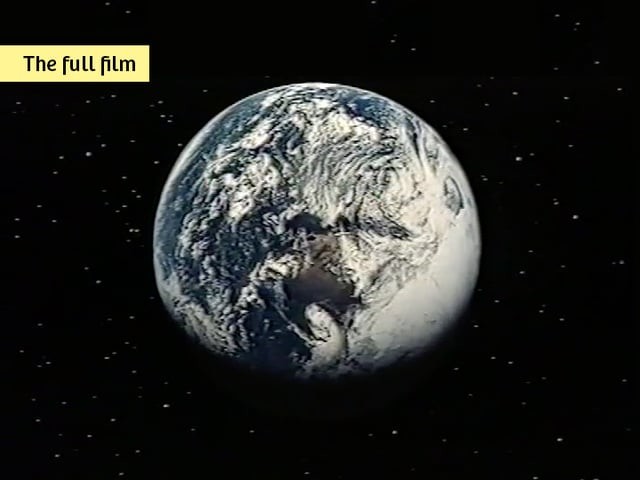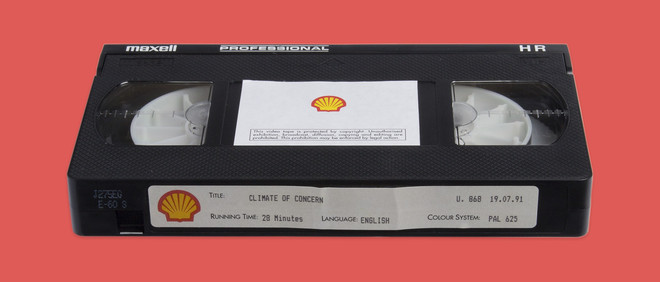For those who want to believe in the basic goodness of human nature and human institutions, the last few months have been rough. Any operating system that spits out Donald Trump as an answer has been badly corrupted. But Trump is a snapshot, a moment – a glitch, perhaps. Backing up to get a longer view can be even more devastating.
I fear that’s the way to think about the newly uncovered Shell video, apparently widely circulated in the early 1990s but not since. It was produced in the original flush of worry about climate change. (I’d written the first book for non-scientists on the subject just two years earlier in 1989.) Global warming was truly unexpected and shocking: here was the second plausible mechanism for wrecking the world, after nuclear war.
It was so shocking that, for a short while, everyone seemed to imagine they would need to play a part in the societal response – including the oil companies.
The video gets everything right
And Shell’s video is terrific: it gets the science right and it gets the context right. “Region by region analysis of world temperature records shows a small but significant warming trend over the century with a marked increase in the 1980s,” the narrator intones solemnly. “What the computer modellers are looking at is the possibility of change at a rate faster than at any time since the end of the ice age. Change too fast perhaps for life to adapt, without severe dislocation.”
Everything foreseen in that video has come to pass, and even faster than scientists feared in the early 1990s
As it happens, everything foreseen in that video has come to pass, and even faster than scientists feared in the early 1990s. There are the tropical islands made uninhabitable, polar ice sheets melting with unimaginable speed, wetland habitats destroyed by intruding salt, droughts cutting harvests in poor areas. Horrors they didn’t even conceive have also arisen: the rapid acidification of the earth’s oceans, for one.
Our scientific understanding of what we’re doing has grown steadily too. We’ve learned, for instance, how much carbon we can burn and still have any chance of warding off even more catastrophic increases in temperature. In order to meet the goal of a 2°C temperature rise, we’d need to keep 80% of the carbon we already know about safely underground.
And our engineers have made remarkable progress in figuring out what we could use instead. The price of a solar panel has dropped 80% in the last decade – there’s no technical barrier, as the Stanford team headed by Mark Jacobsen has demonstrated, to running the world off sun and wind by 2030 at affordable prices.
Doubt and confusion
But – and here’s the devastating part – we haven’t come close to doing what we must to protect the planet. And the biggest reason is that the fossil fuel industry has gotten in the way. Even as one arm of Shell was making this film in 1991, another (stronger) arm was taking part in the Global Climate Coalition, the industry’s first widespread effort to spread doubt and confusion. And this was no honest doubt and confusion. As investigative reporters have shown over the last two years, Exxon had an even firmer grasp on just how bad global warming was going to be. But it chose to sow doubt in the service of its business model.
Shell invested billions to open up the Arctic to large-scale oil drilling – a project possible only because its emissions had begun to melt the ice
Shell eventually left the GCC, but it stayed in other industry front groups that have worked for endless delay: the American Legislative Exchange Council, the American Petroleum Institute. More to the point, it stayed in the business of searching for ever more hydrocarbons, even though science had made clear that we had far more than we could burn. As late as the summer of 2015, Shell was investing billions to open up the Arctic to large-scale oil drilling – a project possible only because its emissions had already begun to melt the ice.
Think about that for a moment. Having watched the Arctic melt, as its own video had predicted would happen, Shell did not say, Hmm, maybe we should divert our capital to the job of developing the solar energy we know we need. Instead, it went looking for yet more oil. In fact, Shell said that it withdrew its plans for the Arctic only because it didn’t find enough oil to justify further drilling.
Even now the company continues to tell a series of self-serving fibs. Shell still insists, for instance, that natural gas might serve as a “bridge fuel” to the future, even though scientists have shown that the methane emitted by fracking adds to global warming, and even though economists have demonstrated that gas slows the necessary conversion to renewables.
Driven by short-term results
The reason for that endless deceit is clear. The early shock about global warming soon gave way, at Shell and other powerful institutions, to a more urgent fear: the fear that something might endanger next quarter’s profits. They’ve had their most lucrative years since 1991, and the quarter century they’ve helped waste may well turn out to have been the critical period for the health of the planet. At the very least, their irresponsibility will be measured in meters of sea level and in degrees of temperature. And in the ever-deepening cynicism about our species and its ability to act morally, and with foresight.
It’s up to the rest of us to counter that cynicism – to keep building a movement large enough to force the Shells of the world to act. Watching this video is a good place to start, because the history that surrounds it reminds us that the real enemy is not so much carbon, but greed.
Climate of Concern: The film Shell made in 1991 to warn about climate change (30 min.)

More on Climate of Concern:

 If Shell knew climate change was dire 25 years ago, why still business as usual today?
A film obtained by De Correspondent reveals that Shell had detailed knowledge on the dangers of climate change more than a quarter of a century ago. Confidential Shell documents date back even further. Yet the oil giant continues to invest in fossil fuels and undermine any ambitious climate action.
If Shell knew climate change was dire 25 years ago, why still business as usual today?
A film obtained by De Correspondent reveals that Shell had detailed knowledge on the dangers of climate change more than a quarter of a century ago. Confidential Shell documents date back even further. Yet the oil giant continues to invest in fossil fuels and undermine any ambitious climate action.
 Shell made a film about climate change in 1991 (then neglected to heed its own warning)
Confidential documents show that Shell sounded the alarm about global warming as early as 1986. But despite this clear-eyed view of the risks, the oil giant has lobbied against strong climate legislation for decades. Today we make Shell’s 1991 film, Climate of Concern, public again.
Shell made a film about climate change in 1991 (then neglected to heed its own warning)
Confidential documents show that Shell sounded the alarm about global warming as early as 1986. But despite this clear-eyed view of the risks, the oil giant has lobbied against strong climate legislation for decades. Today we make Shell’s 1991 film, Climate of Concern, public again.
Other stories from The Correspondent:

 Trump is a climate catastrophe, but the journey to sustainability will go on
This president-elect will make the climate movement’s work a lot harder. But even the US can’t stop the global sustainability transition.
Trump is a climate catastrophe, but the journey to sustainability will go on
This president-elect will make the climate movement’s work a lot harder. But even the US can’t stop the global sustainability transition.






